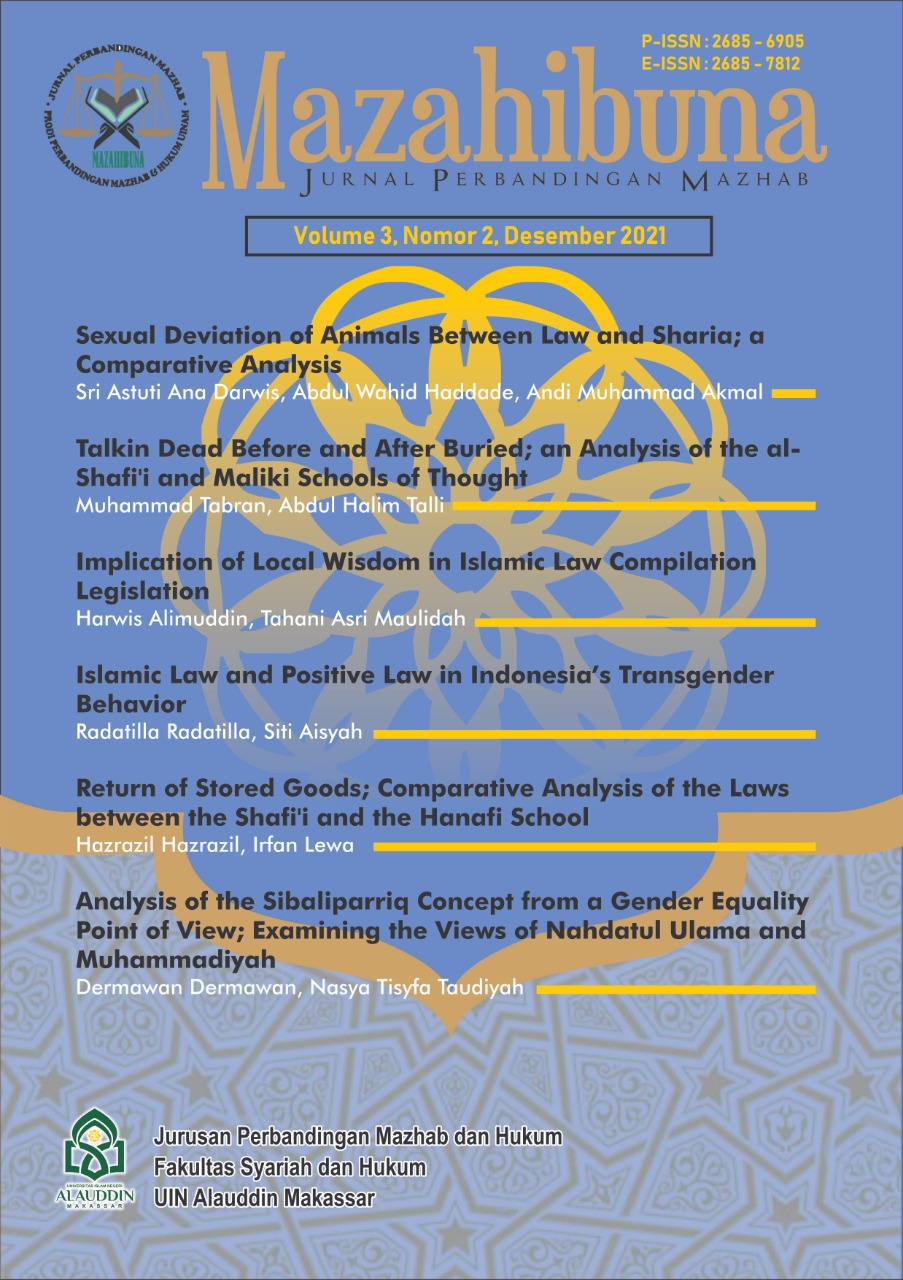Analysis of the Sibaliparriq Concept from a Gender Equality Point of View; Examining the Views of Nahdatul Ulama and Muhammadiyah
Abstract
This study entitled Gender Equality Analysis of the Sibaliparriq Concept in Polewali Mandar Regency (Study of the View of Nahdatul Ulama and Muhammadiyah) puts it into three problem formulations, among others are: How is the Sibaliparriq concept in Polewali Mandar? How do community leaders in Polewali Mandar view Sibaliparriq? And how are the views of Nahdatul Ulama and Muhammadiyah in Polewali Mandar towards Sibaliparriq in line with gender equality in Islam? In answering these problems, the author uses a sociological approach, which is a social approach that studies living together in society. This type of research is field qualitative or field research, which clearly describes the location and object to be studied, systematically, factually and accurately. The data sources used are primary data sources, namely parties or sources who have direct contact with Sibaliparriq's behavior, or sources obtained from informants through observation and interviews. While secondary data sources, namely data obtained in writing or research results about Sibaliparriq, as well as other sources that can add data to this research. The results of this study are about the Sibaliparriq culture adopted by the Mandar community, especially Patoke Village, Sulaluang Village, that the concept of Sibaliparriq which means helping each other, working together, between husband and wife in the household, for example the husband goes to the rice fields, the wife at home also takes busy selling, with this Sibaliparriq very helpful especially in improving the economy in the household, which has become the grip of the mandar community that there will be no problems in the household when there is awareness from a wife to help her husband, for the sake of creating harmony in the household. In addition, Sibaliparriq is certainly very in line with the teachings of Islam, there is no prohibition against a wife working to help her husband, departing from this understanding, it is explained in the Koran (QS al-Nahl 16:97) that Allah does not discriminate between men and women
References
Ahmadi, Abu. 2003. Ilmu Sosial Dasar. Jakarta: PT Rineka Cipta, 2003
Ansar. 2013. Aktualisasi Nilai-nilai Budaya Lokal pada Perkawinan Adat Mandar. Sulawesi Selatan: BPNB Makassar
Bungin, M. Burhan. 2008. Penelitian Kualitatif. Jakarta: Kencana Prenada Media Group
Jubariah, dkk. 2006. Siwaliparriq dalam persfektif pemberdayaan perempuan. Yogyakarta: Beranda Cendikia Konsultan
Fakih, Mansur. 2013. Analisis Gender dan Transformasi Sosial. Yogyakarta: Pustaka Pelajar
Idham Khalid. 2016. Sibaliparriq: Gender Masyarakat Mandar. Balikpapan: Mustamin al-Mandary
Kara, Siti Aisyah. 2016. kontektualisasi Gender Islam dan Budaya. Makassar: Alauddin University Press
Sastrawati, Nila. Laki-laki dan Perempuan Identitas yang Berbeda. Makassar : Alauddin Press Makassar
Pujosuwarno, Sayekti. 1994. Bimbingan dan Konseling Keluarga. Yogyakarta: Menara Mas Offset
Sunarti, Euis. 2006. Indikator Keluarga Sejahtera: Sejarah Pengembangan Evaluasi dan Keberlanjutannya. Bogor: Institut Pertanian Bogor
Ismail, Arifuddin. 2012. Agama Nelayan: Pergumulan Islam dengan Budaya Lokal. Yogyakarta: Pustaka Pelajar
Muthalib, Abdul. 1970. Kamus Bahasa Mandar-Indonesia. Jakarta: Pusat Pembinaan dan Pengembangan Bahasa Departemen Pendidikan dan Kebudayaan.
Nasriah. 2016. “konsep siwaliparriq dalam persfektif Ekonomi Islam di desa Katumbangan Kecamatan Campalagian di Desa Katumbangan”. Skripsi. Fakultas Ekonomi dan Bisnis Islam, Uversitas Islam Negri Alauddin Makassar, Makassar
Mukyati, Sri. 2014. Relasi Suami Istri dalam Islam. Jakarta: Pusat Studi Wanita
Sekretariat Negara, 2009. “Undang-undang Tentang Kesejahteraan Sosial”, https://www.jogloabang.com, diakses pada 1 Desember 2019, pukul 08.19
Masyita, 2016. “Pandangan Al-Qur’an Tentang Konsep Sibaliparriq di Desa Pambusuang Kecamatan Balanipa Kabupaten Polewali Mandar” Skripsi, Fakultas Ushuluddin dan Filsafat, Filsafat dan Politik, Uversitas Islam Negri Alauddin Makassar, Makassar
Darma Dirawan, Gufran. 2009. “konsep siwaliparriq kesetaraan gender dalam pengelolaan lingkungan masyarakat mandar”, http://eprints.unm.ac.id, diakses pada 10 Desember 2019, pukul 01.20
Kementerian Agama RI. 2012. al-Jamil : al-Qur‟an Tajwid Warna, Terjemah Per Kata, Terjemah Inggris. Bekasi: Cipta Bagus Segara
Hilal, Fatmawati. Disertasi: “Implementasi hak Politik Perempuan dalam Masyarakat Islam di Sulawesi Selatan, Studi pada Lembaga Legislatif Sulawesi Selatan” (Makassar: UIN Alauddin Makassar, 2007), h. 97
M. Zein, Satria Efendi. 2000. Analisis Yudisprodensi “Analisi fiqh” dalam Mimbar Hukum, No. 46 tahun XI 2000. Jakarta: al-Hikmah
Rama, Bahaking. 2002. Mengislamkan Daratan Sulawesi : Suatu Tinjauan Metode penyebaran. Jakarta : PT Paradotama Wiragemilang, 2002
Sadily, Hasan. 1983. Sosiologi Untuk Masyarakat Indonesia. Jakarta: Bina Aksara
Sugiyono. 2009. Metode Penelitian Kuantitatif Kualitatif. Bandung: Alfabeta
Ulum, Misbahul dkk. 2007. Model-model Kesejahteraan Sosial Islam, “perspektif Normatif Filosofis dan Praktis”. Yogyakarta: PT Lkis Penlangi Aksara Salakan Baru
Umar, Nasruddin. 1999. Argumen Kesetaraan Gener: Perspektif Al-Qur’an. Jakarta: dian Rakyat
Umar, Nasruddin. 2014. Mendekati Tuhan dengan Kualitas Feminis. Jakarta: PT Elex Media Komputindo

This work is licensed under a Creative Commons Attribution 4.0 International License.
Authors who publish with Mazahibuna: Jurnal Perbandingan Mazhab agree to the following terms:
- Authors retain copyright and grant the Mazahibuna: Jurnal Perbandingan Mazhab right of first publication with the work simultaneously licensed under Creative Commons Attribution License (CC BY 4.0) that allows others to share the work with an acknowledgment of the work's authorship and initial publication in this journal.
- Authors can enter into separate, additional contractual arrangements for the non-exclusive distribution of the published version of the work (e.g., post it to an institutional repository or edit it in a book), with an acknowledgment of its initial publication in this journal.
- Authors are permitted and encouraged to post their work online (e.g., in institutional repositories or on their website) before and during the submission process, as it can lead to productive exchanges, as well as earlier and greater citation of published work.

